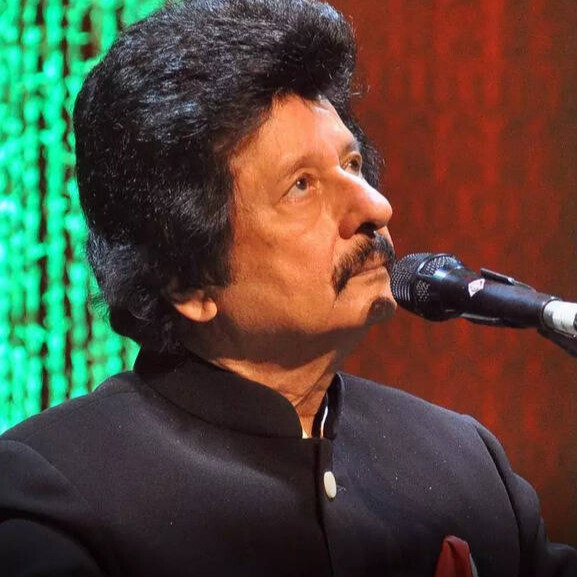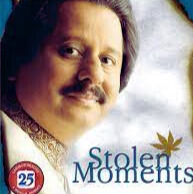No More Pankaj Udhas: Udhas (17 May 1951 – 26 February 2024) was an Indian ghazal and playback singer, known for his works in Hindi cinema and Indian pop. He started his career with the release of the ghazal album Aahat in 1980 and subsequently recorded several hits like Mukarrar in 1981, Tarannum in 1982, Mehfil in 1983, Pankaj Udhas Live at Royal Albert Hall in 1984, Nayab in 196985. After his success as a ghazal singer, Mahesh Bhatt invited him to appear and sing for the film Naam. Udhas gained further fame for singing in the 1986 film Naam, in which his song “Chitti Aayi Hai” (The letter has come) became an instant hit. Later, he went on to work in several Hindi films. Albums and live concerts around the world brought him fame as a singer.

Pankaj Udhas: A Memorable Indian Star Entry
Pankaj Udhas was born in the village of Charkhadi in Jetpur, Gujarat. He was the youngest of three brothers. His parents were Keshubhai Udhas and Jituben Udhas. His elder brother Manhar Udas had some success as a Hindi playback singer in Bollywood films. His second elder brother Nirmal Udas was also a famous ghazal singer and was the first of three brothers to start singing in the family. He studied at Sir BPTI Bhavnagar. His family moved to Mumbai and Pankaj attended St. Xavier’s College there. [clarification needed] The Udhas family belonged to Charkhadi, a town near Rajkot, and were zamindars (transl. traditional landowners). His grandfather was the first graduate from the village and became the Diwan (Revenue Minister) of Bhavnagar State. His father, Keshubhai Udhas, met Abdul Karim Khan, a government employee and renowned veena player, who taught him to play the dilruba. When Udhas was a child, his father used to play a string instrument called Dilruba. Seeing his and his brothers’ interest in music, his father enrolled them in the Sangeet Academy in Rajkot. Udhas initially enrolled himself to learn tabla but later started learning Hindustani vocal classical music from Ghulam Qadir Khan Sahab. Udhas went to Mumbai to train under Navrang Nagpurkar, a vocalist of the Gwalior gharana.
No More Pankaj Udhas: A Memorable Indian Star career

Chandi jaisa rang hai tera, sone jaise baal (Your colour is like silver, your hair is like gold) is sung by Pankaj Udhas. The elder brother of Pankaj Udhas, Manhar Udhas was a stage performer who helped Pankaj in his introduction to music performance.
Four years later, he joined the Sangeet Natya Academy in Rajkot and learnt the nuances of playing the tabla. Thereafter, he pursued a Bachelor of Science degree at Wilson College and St. Xavier’s College, Mumbai, and began training in Indian classical vocal music under Master Navrang. Udhas’s first song “Kaamna” was composed by Usha Khanna in the film and a solo by Naqsh Lyallpuri, his song was much appreciated even though the film was a flop. Subsequently, Udhas developed an interest in ghazals and learned Urdu to pursue a career as a ghazal singer.
He returned to India with renewed enthusiasm and confidence, doing ghazal concerts for ten months in Canada and the US. Ujjal Albak, Aahat, was released in 1980. From this, he began to achieve success and by 2011 he had released over fifty albums and hundreds of compilation albums. In 1986, she made her acting debut in the film Naam, which made Udas famous. In 1990, he sang the melodious song Mahiya Teri Kasam with Lata Mangeshkar for the film Ghayal. This song had become extremely popular. In 1994, he sang the important song “Na Kajre Ki Dhar” along with Sadhana Sargam from the film Udhas Mohra, which also became very popular. He continued to work as a playback singer, making a few screen appearances in films such as Saajan, Yeh Dillagi, Naam and Phir Teri Kahani Yaad Aayee.
The President of India, Dr. Pranab Mukherjee presenting the Padma Shri to renowned Ghazal singer Shri Pankaj Keshubhai Udhas at the investiture ceremony in New Delhi on March 29, 2006. APJ Abdul Kalam passes away.
No More Pankaj Udhas: A Memorable Indian Star
As the curtains drew to a close, there was a sense of finality in the air, tempered only by the enduring legacy that Udhas leaves behind. For though his performances may have ended, his music will continue to reverberate through the annals of time, a timeless testament to the power of melody and the enduring spirit of an Indian star.
In the days that followed, tributes poured in from far and wide, each one a testament to the indelible mark that Pankaj Udhas has left on the world of music. From his humble beginnings to the pinnacle of success, Udhas’s journey serves as an inspiration to aspiring artists everywhere, a reminder that true greatness is born not only of talent but of passion, perseverance, and an unwavering dedication to one’s craft.
As we bid adieu to Pankaj Udhas, let us not mourn the end of an era but celebrate the countless moments of joy, solace, and inspiration that his music has bestowed upon us. For though the stage may be empty, his melodies will continue to echo in our hearts, a timeless reminder of the enduring power of music to unite, uplift, and transcend the boundaries of time and space.
No More Pankaj Udhas: The Last Day: A Memorable Indian Star
Pankaj died on 26 February 2024 at Breach Candy Hospital in Mumbai after a prolonged illness. He is 72. The news of his death was confirmed by his daughter on Instagram. The Prime Minister of India, Narendra Modi expressed his condolences and paid tribute to the legendary musician.
